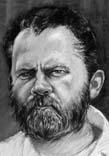|
 Extracts from Extracts from
the Lost Logbook of Christopher
Columbus
Gerry Murphy
The Dedalus Press 1999.
71pp. pbk £5.99
by Gregory O'Donoghue
Freshness and daring have been qualities of Gerry Murphy's poetry from the outset, they also mark 'Extracts from the Lost Log-Book of Christopher Columbus'- his fourth collection, and third from Dedalus. The highly individual method of the poems eludes easy description. Pressed, I would describe the hallmark of this poetry as seriousness, passion even, worked through a ludic, often barbed, imagination. The voice - informed by a keen ear for the mot juste - is characterised by immediacy and a sure sense of dramatic timing, reversal, and under-cutting. This book strikes the lyrical note more frequently than the earlier volumes (' a gleaming curve holds up/ the dark weight of the moon' , or the evocative litany that is 'Too Lovely for Words'etc.) and it is the most highly polished. However, I note in passing (for an exploration would require a monograph) it also has the feel of the latest instalment in an unfolding opus. What is emerging ever more overtly in Murphy's work is a consistent (on its own dissident terms) and coherent ( on its own dissident terms) vision.
A high proportion of the pieces in Log-Book carry an explicit referential tag or title: "after Kuno Meyer", "after Horace"," after Rimbaud", "After Goethe", and so on. None of these "afters" are translations, but variations on other writers' images and subjects. The result is minor glossing of the originals: at the same time, more importantly, they enlarge the book's landscape and population; Murphy's universe is unique without being solipsistic, it is engaged and knowing. When not explicitly referential, the poems tend to be laced and criss-crossed with echoes, resonances and reverberations. Faintly, Psalm 137, " By the rivers of Babylon, there we sat down, yea, we wept" and Elizabeth Smart's 'In Grand Central Station I Sat Down and Wept', sit behind the two line The Fall of Camelot's "By a grassy knoll in Dallas /I lay down and fired". Furthermore, of course, the piece circles back on the opening poem where J.F.K. is "waving furiously/ at me and shouting SHOOT YOU FOOL/ SHOOT" .
 While images, themes, motifs, recur throughout the book, they also frequently chime with cousins in the earlier volumes - sometimes in a very metamorphosed state. Take the balaclava in 'Headgear of the Tribe' (one of Murphy's best known poems, an anthology piece) from Rio De La Plata and all that... "Brits on the pavement/ ice in the wind,/my mother is knitting my first balaclava." It is unlikely a reader familiar with this brief poem will fail to recall it upon coming across the title of the second part of 'Off Summerhill South'- "(ii) Balaclava". But here the sinister headgear has undergone an Ovidian transformation into something warmer: While images, themes, motifs, recur throughout the book, they also frequently chime with cousins in the earlier volumes - sometimes in a very metamorphosed state. Take the balaclava in 'Headgear of the Tribe' (one of Murphy's best known poems, an anthology piece) from Rio De La Plata and all that... "Brits on the pavement/ ice in the wind,/my mother is knitting my first balaclava." It is unlikely a reader familiar with this brief poem will fail to recall it upon coming across the title of the second part of 'Off Summerhill South'- "(ii) Balaclava". But here the sinister headgear has undergone an Ovidian transformation into something warmer:
I am perched
on the edge of the bed,
naked except for a pair Gerry Murphy
of black lace panties by Richard Noonan
drawn down over my face
in order to inhale
your still warm, still moist smell...
In Log-Book, poems regularly bounce off one another. In "There is a God", does the God who basks in the glow of being adored fire "down a dose of clap/ at the priest" because his doze has been disturbed by the noise of the pennies of the "grieving mothers"? Or is it also (and more) because he has an objection to "solace" being mixed with commerce? The fact that the priest is zapped rather than the women seems to indicate the latter reading, which interpretation is bolstered by "Among Thieves" a few pages previously:
"There are pickpockets
in the Cathedral"
warned the bishop.
"They may get
to your purses
before we do"
muttered the worried priest.
The God of 'There is a God' is a curmudgeon. In the poem after it, He is the God who permits Satan to lay disaster and pain on Job. 'A Reading from the Book of Job' is basically a straightforward eight-part précis of the forty-two chapters about what went on in the land of Hus (Uz). Obviously much must be omitted. But one omission may be significant: Job loses his animals, servants, and children before there is any mention of God's dealing with Satan, so the initial privations come out of the blue, seeming even more a matter of Divine whim than might be argued from the original text. The Book of Job ends "So Job died, being old and full of days." Part (viii) of the poem ends "And he died, an old man/ and full of days". Except that the poem has a part (ix) which goes, in full, "And yet..." And yet what? An expression of unease, unsettling doubt, something is unsatisfactory; or those two words are meant to totally subvert the Biblical tale? To whatever degree, they convey dubitation about the doings of God. Political and religious tyrants are recurring presences in Murphy's poems, the God of Job is more than just a curmudgeon? The poems stray lightly onto the big themes.
Meanwhile there had been a lovely three line poem on God on page 34 -
'In the Beginning'
God falls apart,
awareness glitters in the burnished deserts of obsidian,
an astonished sky contemplates an astonished ocean.
The collection is studded with striking passages:
This is where
I peel your name
from that battered, much travelled suitcase-
the heart ('Under the Dog Star')
Because of the surface directness and seemingly casual movement of much of the work, just how polished Murphy's technique is might easily be overlooked- the art that conceals art. He has a mature sense of craft and sure ear. The book's ten haiku (formally exact in 5/7/5 syllabics) illustrate this:
The heron's stillness
against the stark raving weir's
incessant babbling.
('A Mantra for Niamh Connolly')
The title poem comes roughly midway in the collection. A voyage poem that ends up.... well, it is the journey that matters. On Thurs Sept 20 "we saw much weed, a sure sign/ of land." The land next sighted turns out to be a cloud bank. But on Friday Oct. 12 "land some two leagues/ away, some naked people appeared." So, they've made it? Probably not: a full twelve days later, what the final entry records is "More weed." Just prior to that, "A booby"- the gannet mocking from the mirror of the other meaning of its name? And can we even be sure that only twelve days have passed between the 12th and the 24th? Could it be a year and twelve days? Earlier, the Log had recorded:
We set out this morning to continue
our voyage after nearly a month spent
in the Canaries repairing the Pinta.
Nearly a month? The entry is dated Sept. 7th 1493: The Pinta's rudder "jumped out of/ position" Aug 6th 1492. A slip of the quill, or Christopher is out of his tree - suffering, perhaps, from cabin fever. Add to this the fact that he self-confessedly cooks the Log. On Sept. 9 they sail fifteen leagues:
but I decided to score up a smaller amount
so as not to alarm the crew who might
take fright at a long voyage.
And if fifteen is too much, what of the sixty leagues sailed on the following day "scored up" as forty eight? There are other details that make us question the veracity and/or mental equilibrium of the author of the Log. I am reminded of what Waldo Frank wrote about Hart Crane's Columbus: "This Columbus is scarcely a person; he is suffused in his ocean; his will is more substantial than his eye." However, this immram underscores what we never forget anyway - that the strange world of Murphy's poetry requires our alertness. What comes across most from "Extracts" is the peculiar perseverance of the voyager and the lightness of treatment. Indeed, in spite of the subject matter - difficult affairs of the heart, the sense of something grievously flawed in the world and folk - there is something (to borrow the last line from 'One Melville Terrace') "unremittingly cheerful" about this book. It is a fine achievement, a delight I unreservedly recommend. Unreservedly, yet with a warning - as the perfatory poem puts it:"When you expect whistles, it's flutes,/when flutes, whistles."
|

 Extracts from
Extracts from